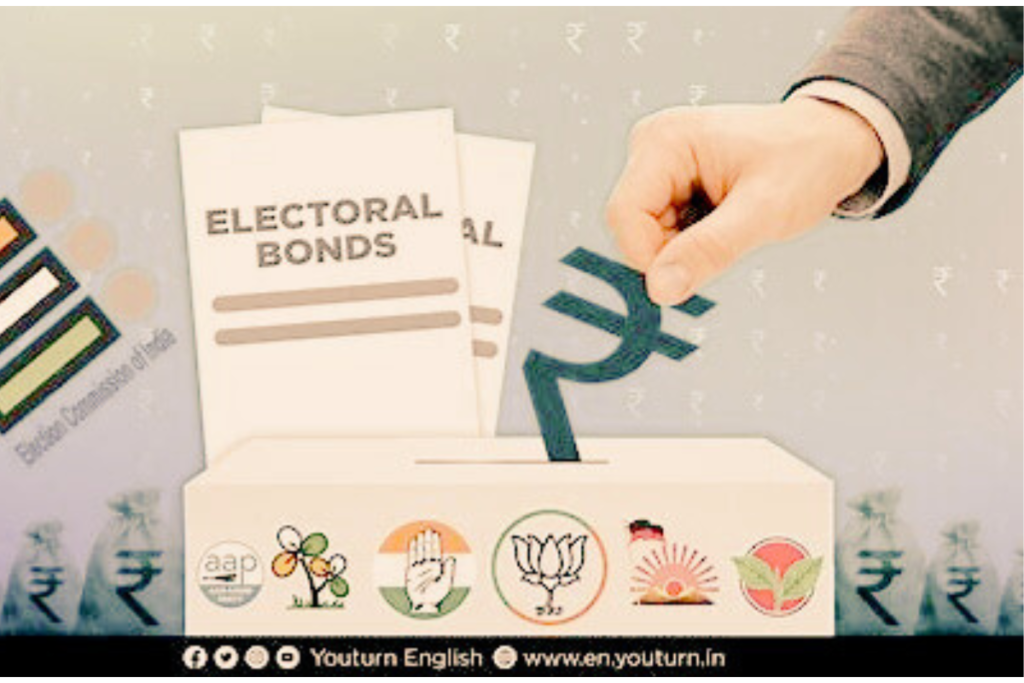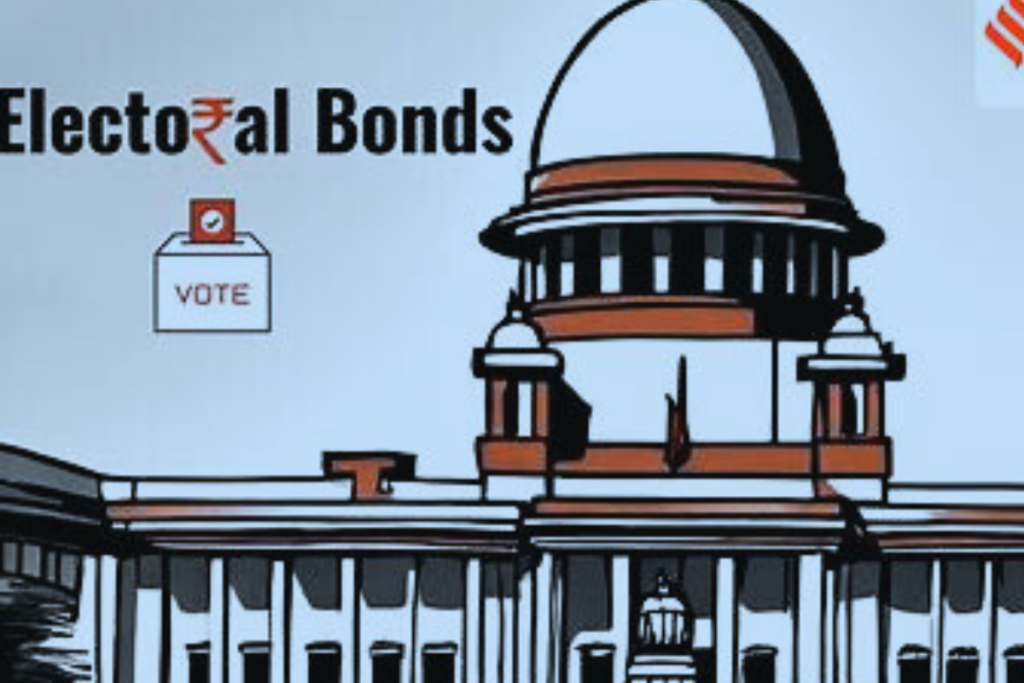Introduction:
Giving money to politicians impacts policies and choices in modern democracies. This financial predicament revolves around Electoral Bonds, which allow individuals and businesses to donate to political parties. In “The Power of Electoral Bond: Shaping Political Funding,” we explore the complex financial transactions that make this system work.
By understanding Electoral Bonds, we can see how they potentially impact political campaign funding, affecting openness, responsibility, and democracy itself. Join us as we discuss Electoral Bonds and their impact on campaign finance.

How is "political funding" defined?
Political parties, politicians, and campaigns get funding from individuals, groups, and entities. This is “political funding.” Political parties need it to campaign, educate the public, and perform successfully. Politics can raise funds through individual donations, fundraising events, membership fees, state subsidies, and corporate donations.
Each country regulates and discloses political fundraising differently. The process is fair, open, and free from unjust control due to laws and rules. Political finance is a hot topic worldwide. These include money in politics, conflicts of interest, and transparency.
What does "Political Funding" signify for parties?
Political groups need money for several reasons:
Campaigning
Political parties need money to win elections. This includes protests, commercials, printing campaign materials, recruiting personnel, and other voter-incentive activities.
Infrastructure and Operations
Maintaining buildings, running business, and supporting party infrastructure costs money. An easy party needs money to pay workers and rent office space.
Research and Strategy
Good political campaigns require research, data analysis, and strategic planning. Parties can fund market research, polling, and planning
Media and Communication
Parties need money to cooperate with the media, generate content, and reach the public via TV, radio, social media, and print.
Outreach and Mobilization
Political parties require money to reach voters, mobilize supporters, and engage communities. This involves event organizing, door-to-door campaigning, and outreach.
Political groups require money for campaigns, work, and more. It aids parties in communication, voter engagement, and democratic warfare.
How to define the "Electoral Bond" and how it is related to "Political funding"?

Indian political groups receive funding from Electoral Bonds. People and businesses can acquire these bonds from authorized banks with real money. Give these bonds to any political party, and they can cash them in through their bank accounts. Best of all, Electoral Bonds allow funders to remain anonymous because neither the public nor the recipient party knows who contributed the money.
Because electoral bonds allow contributors to fund political parties, they are linked to political funding. They trace political donations through banking systems to make them clearer. Electoral Bonds allow political parties to receive legal money in a systematic and documented manner. This means parties can utilize less financial presents and possibly less “black money” in political funding.
Electoral Bonds’ anonymity has raised concerns about their transparency and accountability, as they allow people to donate and influence politics without being seen. Electoral Bonds and political donations demonstrate how difficult it is to balance money, openness, and political honesty.
"Electoral Bond" funds politics. How does "Electoral Bond" affect political funding and transparency?
Electoral Bonds could revolutionize politics funding and transparency in several ways:
Documented and Legitimate Transactions
Electoral Bonds encourage contributors and political parties to transact legally. It ensures money can be tracked and meets legal criteria by only allowing bank bond purchases.

Reduced Cash Transactions
Electoral Bonds reduce political fundraising from cash gifts. Cash deals can be lost, allowing “black money” to enter politics. Bonds can make financial presents less mysterious by encouraging electronic transactions.
Anonymity and Privacy
Electoral Bonds allow donors to remain anonymous, raising concerns about openness, but they also provide some privacy. This could make it simpler for more people and groups to donate to political parties without fear, especially in difficult political environments.
Regulated and Accountable Donations
Electoral Bonds are offered only during a particular time period and under government restrictions. This monitors political donations and ensures donors are accountable and transparent.
Increased Accountability
Regulation of Electoral Bonds and the need that parties cash them in through registered bank accounts can increase political expenditure accountability. This creates a printed record that can be examined for legal compliance.
Electoral Bonds are a new way to fund politics that aims to make things more open and responsible, but their impacts are still being examined and debated. Many factors affect political financing transparency. How well Electoral Bonds prevent illegal money from entering politics and protect donor privacy are crucial.
Why is a "Electoral Bond" tied to "Documented and Legitimate Transactions"?
Detailing the relationship between Electoral Bonds and “Documented and Legitimate Transactions”:
Financial Trail
Donors must acquire Electoral Bonds with real money through banks. There’s a clear money trail to trace the gift’s origin. The trade procedure includes specified processes including “Know Your Customer” (KYC) checks and bank account verifications to verify bond purchases.
Legal Compliance
Electoral Bonds must be purchased from approved banks within a set timeframe to ensure political donation compliance. This controlled technique prevents unethical donations and clarifies donor-political party money transfers.
Tax Compliance
Donors and political groups using Electoral Bonds pay higher taxes. Transactions through banks are more likely to be recorded appropriately for tax purposes. This can reduce tax evasion and open election finance.
Auditability and Accountability
Auditability and accountability are available with Electoral Bond transaction records. To ensure legality, Electoral Bond donations can be tracked, reviewed, and monitored. This transparency allows political fundraising tactics to be reviewed.
Regulatory Oversight
Government laws oversee electoral bond purchasing and selling. The laws require lawful and well-documented deals to protect the financial system, prohibit illegal activity, and make political donations more transparent.
Electoral Bonds depend on transactions being properly recorded and legalized, demonstrating the importance of open, responsible, and regulator-compliant political funding. Electoral Bonds wants to enhance trust in the donation process and promote ethical fundraising by formalizing political party donations.
How does "Electoral Bond" relate to "Reduced Cash Transactions"?
Electoral Bonds reduce political campaign funding by:
Encouraging Electronic Transactions
Electoral Bond donors must acquire bonds through banks. This promotes electronic payments over cash. More people use online payment methods, reducing political cash donations. The procedure is more transparent and trackable.
Tracing the Source of Funds
Since Electoral Bonds must be obtained through formal banking means, politicians’ donations may be traced. This makes finding donors easier and ensures they originate from verified sources. This reduces the secrecy and misuse of cash transactions.
Curbing Black Money
Political campaigns using cash might raise concerns about “black money” and hidden wealth. Electoral Bonds encourage transparent, accountable financial transactions through controlled banking channels to prevent illegitimate money from entering politics.
Minimizing Opportunities for Corruption
Cash can lead to unreported corruption, bribery, and political gifts. Election Bonds reduce these dangers by creating a structured system that makes it harder to do business behind closed doors and encourages official and well-documented political party donations.
Enhancing Transparency and Accountability
Electoral Bonds reduce cash transactions, making political funding more transparent. Electronic transactions provide an audit trail that can be examined and monitored to ensure legal and financial donations.
Trackable electoral bonds encourage electronic payments and reduce cash transactions, making politics finance more transparent, responsible, and controlled. Formalized and written transactions increase political funding confidence, honesty, and lawfulness.
What does "anonymity and privacy" entail and how does it relate to "electoral bonds" and fundraising?
Protecting people’s identities and personal information during trade or activity is crucial. Anonymous political fundraising and Electoral Bonds allow donors to remain anonymous. Privacy and safety for donors are provided via confidentiality. Their political ideas and contributions don’t attract attention or consequences.
Electoral Bond privacy and secrecy may be explained as follows:
Identity Protection
Electoral Bonds allow donors to support political parties anonymously. This provision keeps donors’ political opinions private. This is especially relevant where political ideas may affect social, professional, or personal life.
Risk Mitigation
Anonymous donors are less likely to be harassed or discriminated against for their political donations. Election bonds allow persons and groups to donate to political campaigns without fear. Because givers’ privacy is safeguarded.
Encouraging Contribution
Electoral Bonds encourage political party donations because they are anonymous. Privacy and anonymity make Electoral Bonds a safer way to donate to political campaigns. More people may support political causes.
Promoting Free Expression
Electoral Bonds allow anonymous political donations to encourage free expression. This safeguards free speech and union. Donors can finance political causes without public scrutiny. This promotes democratic involvement.
Balancing Transparency with Privacy
Donor anonymity protects them but raises concerns about political spending transparency. Finding a balance between openness and privacy helps Electoral Bonds maintain accountable while preserving donors’ generosity.
Since they preserve supporters’ identity and privacy, Electoral Bonds can stimulate political donations while making them feel safe, free, and private. In a democracy, this characteristic of Electoral Bonds increases political donations and protects privacy.
How does "Electoral Bond" comply with government "Regulated and Accountable Donations" laws?
If Electoral Bonds follow these stages, they can meet the government’s “Regulated and Accountable Donations” guidelines and stay legal:
Government Regulations
The government regulates electoral bonds to ensure they are issued, sold, redeemed, and utilized lawfully. These regulations ensure Electoral Bonds comply with legal requirements by defining their rules, procedures, and limits.
Authorized Issuers
Only government-approved banks can sell Electoral Bonds. These bonds are issued by select financial institutions. This method, the government monitors and supervises Electoral Bond circulation to ensure legitimate distribution.
KYC Compliance
Electoral Bond buyers must undergo KYC checks to verify their identity. KYC ensures donors can be traced and respect the law, making gifts more responsible.
Limited Time Frame
The government limits the duration of Electoral Bonds. A time constraint on buying Electoral Bonds controls money flow through these securities. Reduces misuse and ensures payments are made on time as required by regulators.
Encashment Protocols
Political groups must cash in Electoral Bonds within a set timeframe using certain bank accounts. Cashing in helps track political parties’ Electoral Bond use. This ensures donations are handled ethically and legally.
Financial Reporting
Donors and political parties that employ Electoral Bonds must keep financial records and disclose these payments. Open reporting rules ensure that Electoral Bond donations are traced, recorded, and transparent to regulators.
Electoral Bonds can be used to give political campaigns regulated and responsible gifts by obeying the law, government norms, and accountability procedures. Structured procedures like these keep things honest, open, and in compliance with political party funding regulations.
How has the "Electoral Bond" "Increased Accountability" in political funding, and how can it be verified?
As part of making political funding more accountable, “Electoral Bonds” develop processes that may be examined for compliance in several ways:
Transparency in Transactions
Electoral Bonds increase openness by having transactions occur through banks. This records and tracks money flow. This makes people more responsible because Electoral Bonds’ money path may be checked for legality.
Encashment through Designated Bank Accounts
Political groups must cash in Electoral Bonds through specified bank accounts within a certain timeframe. This requirement records money received and allows detailed investigation to ensure trades are done legally.
Audit Trail
Electoral Bonds are issued and redeemed with a record that may be verified. By tracking when these bonds were bought, moved, and cashed in, regulators, auditors, and oversight groups may track money, verify donations, and check for law violations
Regulatory Oversight
Electoral Bonds are issued and utilized according to government regulations. Regulators can audit, and people must observe these rules. This makes political finance transparent, accountable, and questionable.
Financial Reporting Requirements
Electoral Bond donors and political parties must report these contributions in their financial statements. By making people record their spending, this reporting method increases accountability. This enables people verify compliance with laws.
Independent Oversight and Evaluation
Independent monitoring and Evaluation: Electoral Bonds can verify compliance by independent monitoring bodies, audit firms, and regulatory authorities. These bodies evaluate and assess Electoral Bond donations to ensure compliance. Political donations become more transparent.
Electoral Bonds make political financing more transparent by creating explicit, auditable processes. People can be held accountable more via Electoral Bonds. Structured systems, paperwork requirements, and monitoring allow people to monitor and evaluate political funding transactions.
What are the Constraints of using the "Electoral Bond" for "Political financing" with Transparency under regulatory compliance of the Government?
Electoral Bonds aim to make political spending more transparent and legal, but they have drawbacks.
Here are some restrictions:
Anonymity Concerns
Electoral Bonds donors’ names are hidden from the public and political parties, raising transparency concerns. This lack of transparency makes it tougher to track campaign funds and hold people accountable.
Limited Disclosure
Electoral Bonds may not require donor names and amounts, making political donations less transparent. It may be difficult to determine political parties’ funding without complete disclosure rules.
Potential for Misuse
Anonymous Electoral Bonds could be used to launder money, circumvent gift limitations, or transmit covert money to political parties. These dangers hinder political spending transparency and accountability.
Impact on Level Playing Field
Electoral Bonds could offer wealthy donors or businesses an edge over small donations, tilting the playing field and changing elections based on money rather than public support. This imbalance might compromise election fairness and trust.
Complex Regulatory Framework
Electoral Bond requirements can be difficult to implement, monitor, and follow. Making sure people follow the rules, stopping system abuse, and addressing gaps may need powerful regulatory systems that are hard to implement.
Public Trust and Perception
If people think the political funding system isn’t transparent or responsible, Electoral Bonds might lower trust. People may distrust democratic institutions if they doubt political party financing.
Need for Continuous Evaluation
The Electoral Bonds system must be regularly examined and updated to address new issues, reduce risks, and make political funding more transparent and accountable. Regularly evaluating and updating regulations and procedures ensures that Electoral Bonds promote rule-following and openness.
To maximize Electoral Bonds’ ability to promote openness, regulatory compliance, accountability, and integrity in political funding and the electoral process, these issues must be addressed.
How could political groupings use a "Electoral Bond" to solve the constraints as discussed above?
Political parties should consider the following to avoid the issues with utilizing Electoral Bonds to fund campaigns and make things more transparent and legal:
Increased Disclosure Requirements
Political parties can improve disclosure by providing more Electoral Bond donation details. Party leaders can demonstrate transparency by publishing donor names and amounts beyond legal requirements.
Strengthened Regulatory Oversight
Working with regulators to strengthen supervision and enforcement can reduce misuse and increase regulatory compliance. Political organizations can engage with regulators to establish effective monitoring systems, audit repeatedly, and fix Electoral Bonds system issues.
Enhanced Due Diligence
Strict due diligence measures can reduce anonymity concerns and prevent unlawful donations when Electoral Bonds are utilized to solicit donations. Political parties can establish internal compliance mechanisms to verify contributors and ensure legal and moral donations.
Engagement with Stakeholders
Trusting and engaging with stakeholders like the public, media, and civil society groups can make political spending more transparent. Political parties can freely discuss how they use Electoral Bonds, address stakeholder issues, and request comments on how to improve transparency.
Adoption of Best Practices
To maximize Electoral Bonds, learn from overseas political fundraising openness and accountability best practices. Political parties can learn from other countries’ transparency strategies to improve their own.
Promotion of Ethical Fundraising
To restore public trust, ethical fundraising and political funding honesty must be stressed. Political parties can adopt codes of conduct, ethical regulations, and transparency principles to demonstrate their commitment to ethics and good stewardship of Electoral Bond funds.
Political parties can demonstrate their commitment to democracy, transparency, and public faith in elections by fixing Electoral Bond issues and promoting openness, accountability, and compliance. Working together to make political finance transparent can promote democracy and political trust.
Conclusion: "The Power of Electoral Bond: Shaping Political Funding"?
Finally, Electoral Bonds will transform political campaign funding. These linkages create distinct opportunities and challenges for political party donors. Looking at “The Power of Electoral Bond: Shaping Political Funding,” this new approach could transform political donation giving, acceptance, and verification.
Electoral Bonds could make political financing more transparent, responsible, and legal, but they also raise privacy concerns and the need for additional transparency. Finding a balance between private and public scrutiny is difficult. To maximize the potential of Electoral Bonds, openness, government control, and ethical financing are needed.
As political funding develops, political parties, regulators, civil society, and the public must talk positively about the Electoral Bonds system, work together, and evaluate it. If we work together to solve problems, encourage honesty, and follow openness and responsibility best practices, Electoral Bonds can convert political funding into a more transparent, accountable, and fair system.
Electoral Bonds influence political spending beyond money. They’re also known for honesty, justice, and democracy. Smart and responsible use of this power can lead to political fundraising that respects openness, accountability, and trust. This will improve democracy and electoral integrity.
Pingback: Exploring the Impact of the Supreme Court Ruling on Electoral Bonds - bloggingtrendz.in